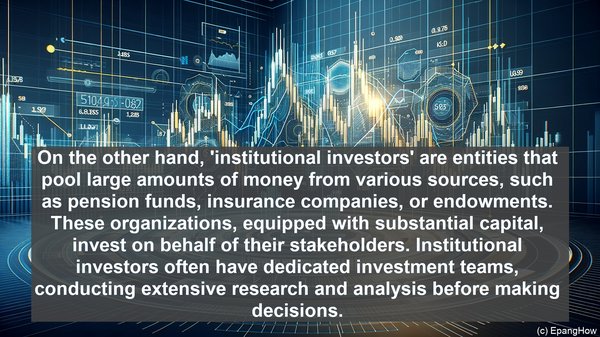Introduction: The Investor Spectrum
Hello and welcome! When it comes to investing, there’s a diverse range of participants, each with their own objectives and strategies. Today, we’re focusing on the retail investor and the institutional investor, two key players in the financial landscape.

Defining the Retail Investor
The term ‘retail investor’ refers to individuals or small groups who invest their personal funds in the financial markets. These can be everyday people like you and me, investing in stocks, bonds, mutual funds, or other assets. Retail investors typically operate through brokerage accounts, where they buy and sell securities.
Understanding Institutional Investors
On the other hand, ‘institutional investors’ are entities that pool large amounts of money from various sources, such as pension funds, insurance companies, or endowments. These organizations, equipped with substantial capital, invest on behalf of their stakeholders. Institutional investors often have dedicated investment teams, conducting extensive research and analysis before making decisions.

Investment Objectives: Divergence and Convergence
One of the key distinctions between retail and institutional investors lies in their investment objectives. Retail investors often aim for personal financial goals, such as saving for retirement, funding education, or growing their wealth. Their investment decisions are driven by factors like risk tolerance, time horizon, and individual preferences. Institutional investors, on the other hand, have broader objectives. While they seek returns, their investments also serve strategic purposes, like diversifying portfolios, hedging risks, or generating income for their stakeholders.
Market Impact: The Scale Factor
The sheer size of institutional investors gives them a significant impact on the markets. When these entities make substantial trades, it can move prices, creating ripples in the financial world. Retail investors, due to their smaller trades, may not have the same level of influence. However, the collective actions of retail investors, especially in the age of social media and online communities, can sometimes result in ‘retail investor activism,’ where coordinated buying or selling can have notable effects on specific stocks or sectors.
Access and Information: The Playing Field
Institutional investors often have access to a wide range of resources and information. They may have relationships with analysts, receive research reports, or even engage in private conversations with company management. Retail investors, while having access to public information, may not have the same level of depth or immediacy. However, the democratization of information through the internet has narrowed this gap to some extent, with retail investors now able to access research, news, and insights from various online platforms.
Regulatory Considerations: Balancing the Scales
Given the potential impact of institutional investors on the markets, there are often regulatory considerations in place. These can include restrictions on certain types of trading, disclosure requirements, or even rules to prevent market manipulation. Retail investors, while also subject to regulations, may have different thresholds or obligations. The aim is to ensure fair and orderly markets, where all participants have a level playing field.
